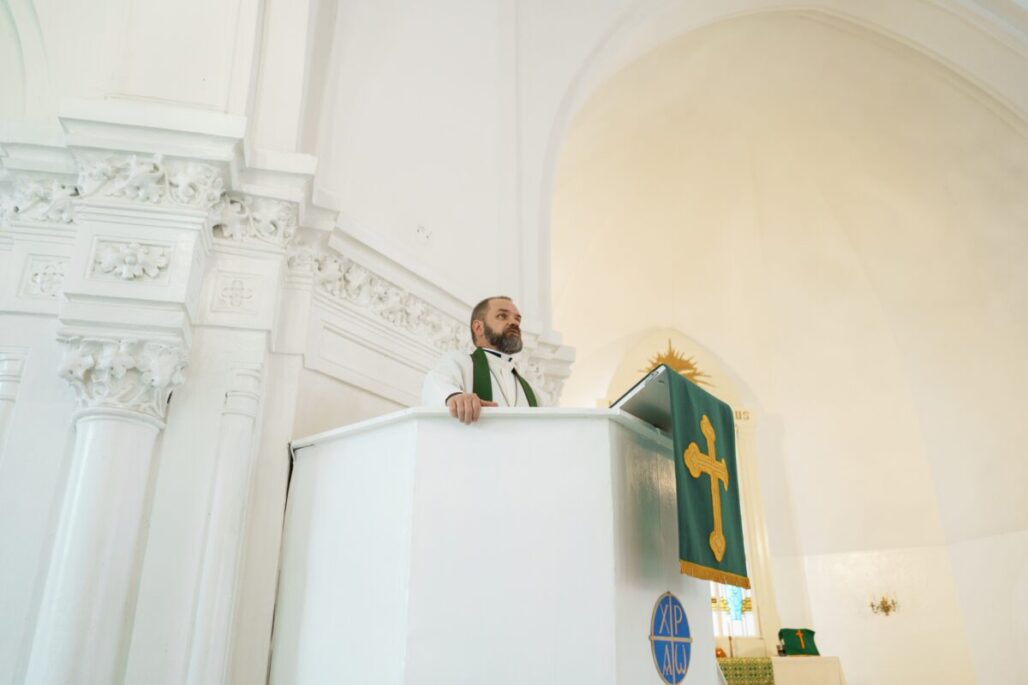I also say this as a historian of Christianity. I teach students all the time about seasons of despair and renewal in the church. I’m not the first to point out problems to God’s people. Church history is full of “prophets” pushing gloom and doom on others, making outsized claims about their generation’s sins.
Our Churches Are in Crisis
Still, our churches have taken a special kind of beating in recent years. And even traditionalists like me think revival is required when so many of us suffer from cheap grace, tribalism, spiritual laziness, and “gospels” that have displaced the cross with self-absorption. Since the time of the Reformation, we have debated when and in what conditions we need change—difficult change that requires hard work and a risky sort of witness. It’s been concluded that in times of acute persecution, when the gospel is at stake, when the church is on the ropes, we must stand up and fight for costly discipleship.
This debate dates back to the mid-16th century row when Lutherans, especially, wondered whether they had arrived at a status confessionis (“a situation of confession”). This is such a time. Many churches are in crisis—especially in the West, but in other places too. Attendance has dropped. An alarming number of young people doubt whether church membership even matters. Some of their elders seem to care more about wealth and power, their status and control of worldly narratives and systems, than about following Jesus. Of course, idolatry is not unique to seniors. Its tentacles are reaching into every generation.
Many Christians, young and old, have misplaced priorities. Many of us spend more time on sports than we do reading the Bible. We make more time for media than meeting others’ needs. We pray very little, and not very hard. Our plans for retirement are mostly R&R. We are hedging our bets regarding life in the world to come, investing more of our free time and excess income in mundane pastimes than in the kingdom of God. Many of us today would pay as much we can afford to extend our worldly lives for just a few more months. To use the language of the Puritans, we don’t seem to have weaned our affections from the world.
This is not lost on others. Many wonder how to account for the discrepancy they see between what Christians profess and what we do with our lives. They wonder just how deeply we believe what we say. And if we don’t believe it, why should anybody else? Maybe churches aren’t worth all the time they require. There are better ways to live our best life now than spending hours per week in institutions that too often apply a thin coat of God-talk and tepid spirituality to weak and rotting boards.
Many wonder how to account for the discrepancy they see between what Christians profess and what we do with our lives.
I was haunted by a frequent dream in 2021. I dreamt that our churches offered comprehensive health checks every five years. We tested members on their knowledge of God, details of the Bible, growth in sanctification, service to the needy, evangelism, and more. And we found that while a tiny group did grow in grace over the past five years, most church members did not. Of course, this was only a dream. But I fear that if we did indeed run such tests, my nightmare would recur in real life.
I’m concerned that too few Christians are growing anymore. Too few of us are ready for the Bridegroom’s return. Many in the West are too comfortable to give much thought to the world to come, let alone to keep our lamps lit and yearn for it.
There are wonderful exceptions to the rule I’m describing, many of them in churches led by people involved in TGC. Many of you are spending yourselves in lives of costly discipleship and doing all you can to encourage other disciples. Still, I bet you’re discouraged by what passes for discipleship in society at large. And I hope you’ll agree that something drastic needs to be done—and that none of us can do it on our own.
How Reformation Begins
The Bible and church history show us over and over again that when God’s people come together, repent of their sins, cry out to him for mercy, and expect him to respond, God uses them to bring about needed reformation. And when their leaders help each other to promote such behavior, there’s no limit to the scale on which the Lord will bless his people. There’s no simple quid pro quo in the history of redemption. But there is a correlation between mortifying sin and walking by the Spirit, between humbling ourselves in God’s sight and being exalted.
When [church] leaders help each other to promote [godly] behavior, there’s no limit to the scale on which the Lord will bless his people.
I’m devoting this column, then, to costly discipleship. In future pieces I will write about the promise and the peril of following Jesus; walking the way of the cross; actually cultivating a yearning for maturity in churches and mature, godly, winsome witness in the public square; and engendering desire for leaders who model and commend such maturity.
Bonhoeffer’s Example
The best-known discussion of the need for costly discipleship, bold Christian confession, and reformation in churches after the 16th century took place during the rise of National Socialism in Germany. A group of church leaders, most famously Karl Barth and Dietrich Bonhoeffer, opposed both the Nazis and the so-called German Christians (Christian nationalists who backed Hitler in the name of Christ). I do not affirm everything these brave leaders said. But I do admire Bonhoeffer’s witness to the gospel—even unto death. He was hanged by the Nazis in a concentration camp, which lent credence to his best-known book, The Cost of Discipleship. In it he writes:
When Christ calls a man, he bids him come and die. . . . The cross is laid on every Christian. The first Christ-suffering which every man must experience is the call to abandon the attachments of this world. It is that dying of the old man which is the result of his encounter with Christ.
How many of us today, especially in the United States, have really died with Christ? How many of us have abandoned the attachments of this world? We need to hear these words again as we pursue real discipleship amid our era’s false gospels.
How many of us today, especially in the United States, have really died with Christ? How many of us have abandoned the attachments of this world?
If we wish to attract and grow genuine disciples, we must offer much more than inspiring civil religion, spiritual pep rallies, and pageantry. We must demonstrate a kind of faith known not for power and “success” but for weakness; scandalous not for hypocrisy but for hardship. As the apostle Paul wrote,
God chose what is weak in the world to shame the strong; he chose what is low and despised . . . even things that are not, to bring to nothing things that are, so that no human being might boast in the presence of God. And because of him you are in Christ Jesus, who became to us wisdom from God, righteousness and sanctification and redemption, so that, as it is written, “Let the one who boasts, boast in the Lord.” (1 Cor. 1:27–31)
And as Christ himself exhorted in the Gospel according to Matthew:
If anyone would come after me, let him deny himself and take up his cross and follow me. For whoever would save his life will lose it, but whoever loses his life for my sake will find it. For what will it profit a man if he gains the whole world and forfeits his soul? Or what shall a man give in return for his soul? For the Son of Man is going to come with his angels in the glory of his Father, and then he will repay each person according to what he has done. (Matt. 16:24–27)
O Lord, have mercy. Please help us not to forfeit our souls. Help us to promote reformation in our time. May we be found ready when you come.









